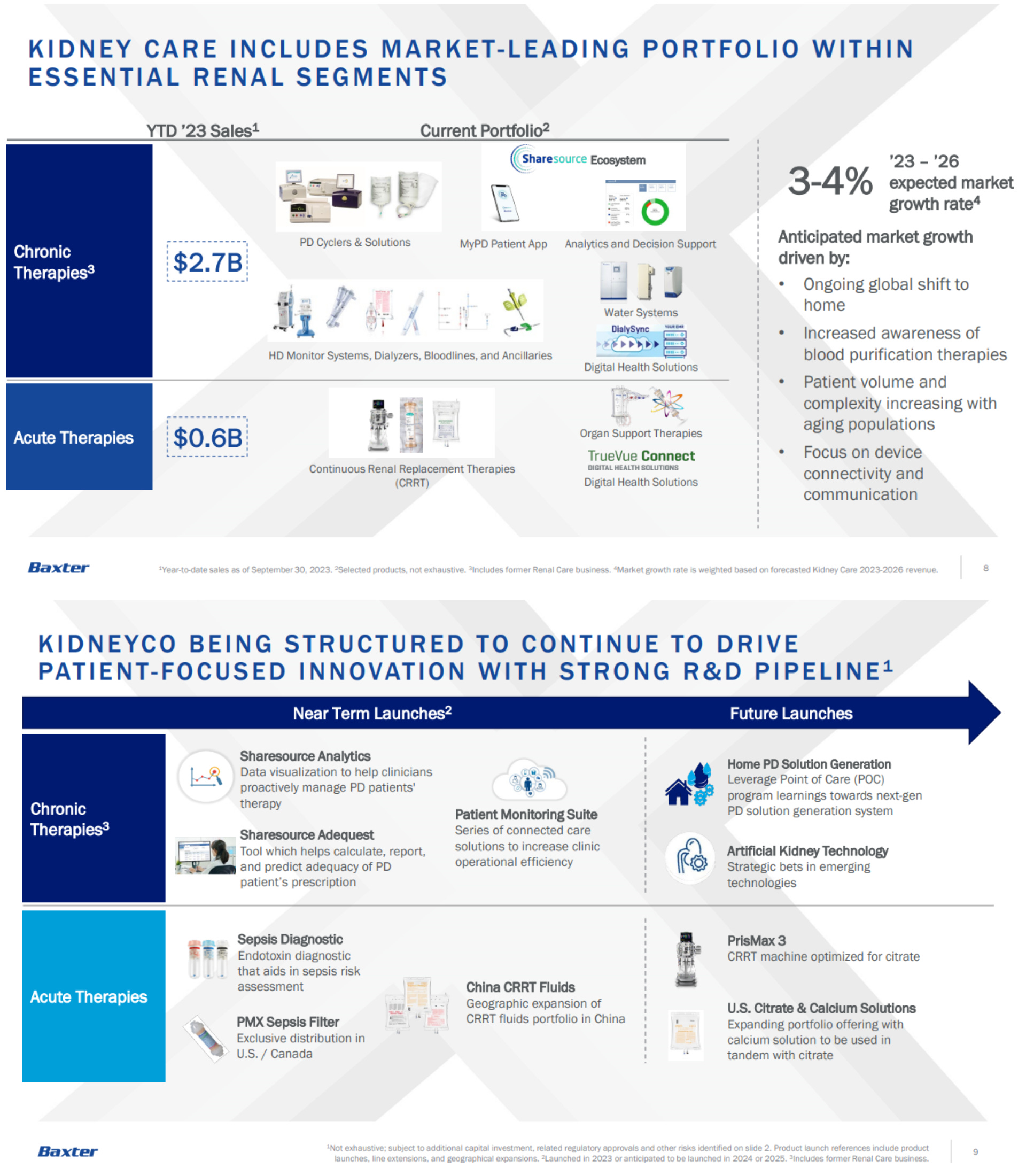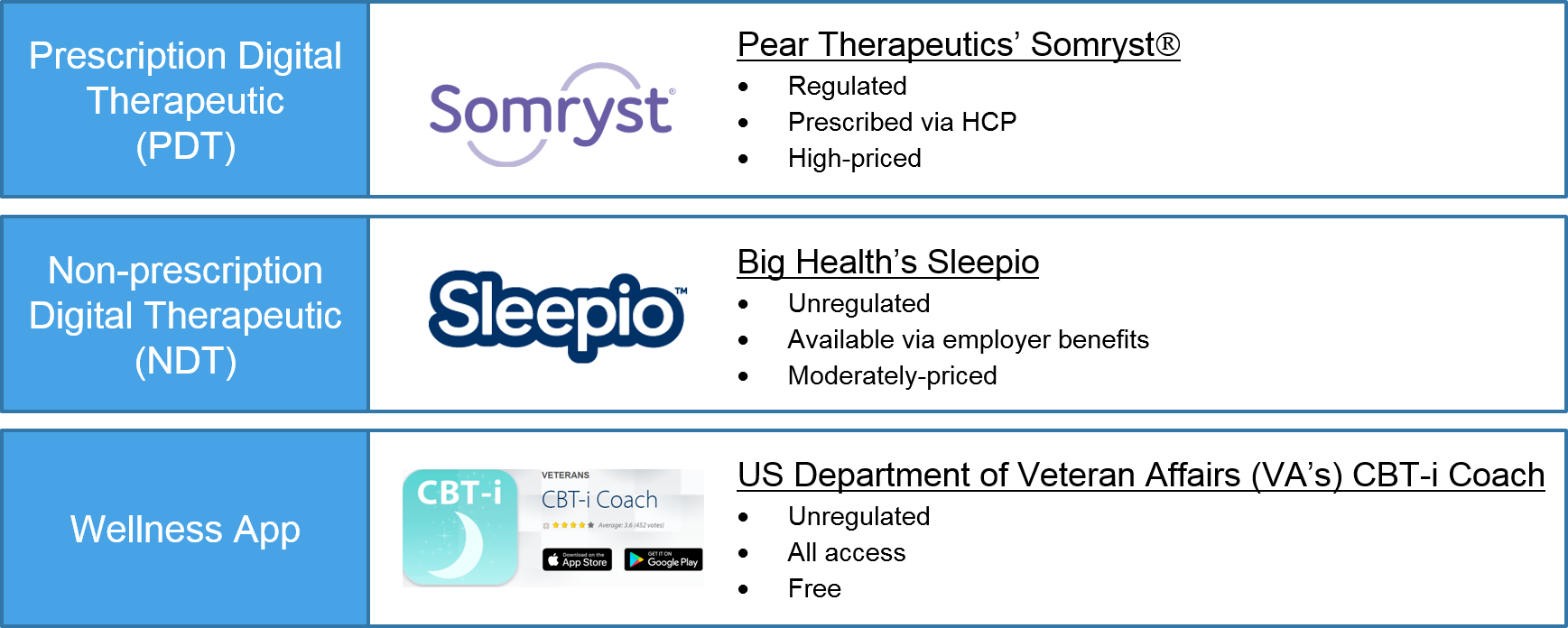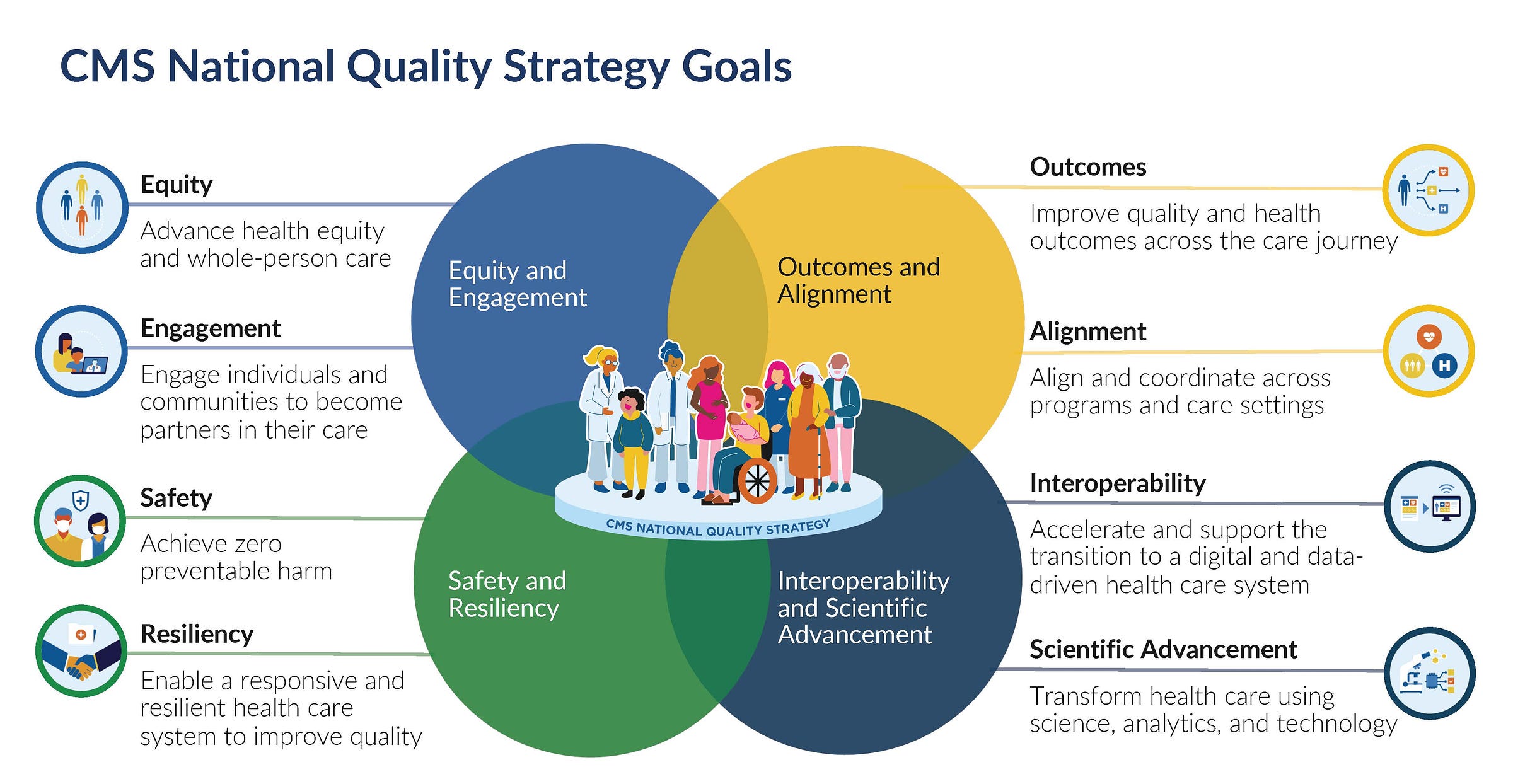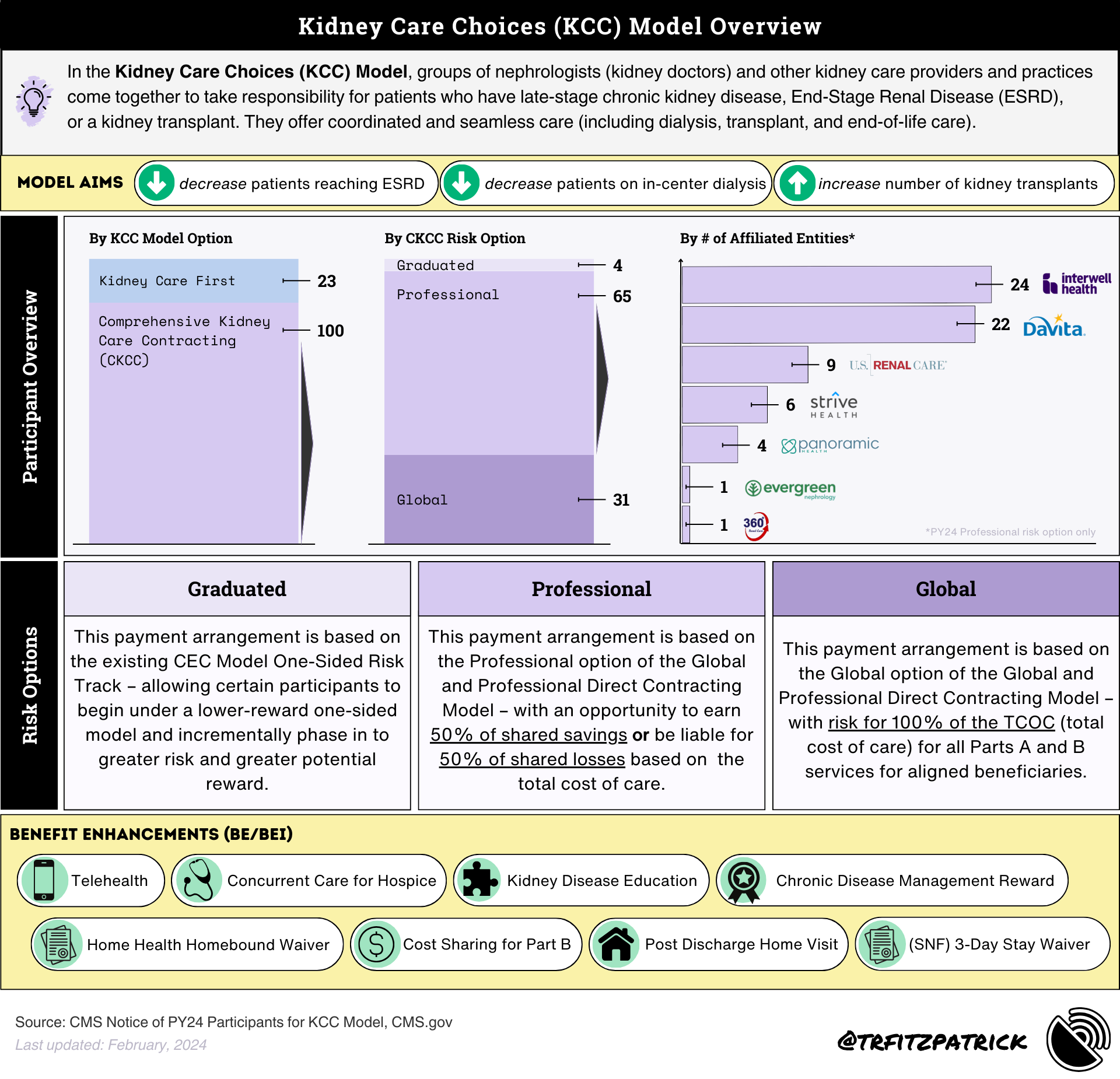Across the Kidneyverse: February 15, 2024
This month: CMS, CVS, Patient Navigation, and Global Kidney Health.
Welcome to our second Kidneyverse recap for 2024. It sounds like many of you are fans of this format, so we’ll keep the headlines, closer looks, & visual of the week coming your way every month.
A few housekeeping notes before we dive in.
First, if you want to make sure I know about some key news, studies or events, share it with me in the Signals Inbox here.
Second, I think Kidneyverse Careers is officially the first (only?) place dedicated to bringing top talent to top companies across kidney care verticals If you’re looking for key hires or open roles from devices to diagnostics (and beyond) start here.
Lastly, I look to many of you as leaders in your respective skills and spaces. I want to continue cultivating and amplifying your expertise with the other 10,000 sets of eyeballs reading this each month through my expert Q&As and writing. If you’re interested in sharing your unique POVs and approaches in the space, say hello.
IN THIS ISSUE
Headlines
Here’s what caught my eye across the Kidneyverse this month:
CVS' Aetna will begin offering in-home care services to its Medicare Advantage members with chronic kidney disease through a partnership with Monogram Health. This comes after CVS Ventures joined a $375M funding round for Monogram in in January, 2023. (Becker’s Payer)
Monogram also announced a partnership with Blue Cross Blue Shield of Arizona, where AZ Blue will use Monogram’s network of in-home providers and support services to improve care for their members. (PRN)
Somatus just announced a partnership with Sun Life U.S. to deliver Kidney Care 360 and Heart Care 360, extensions of Sun Life’s Clinical 360 Program. (PRN)
Mumbai-based Neodocs raised $2 million from Omidyar Network, Y Combinator, and 9 Unicorns to double down on its smartphone-based home testing products focused on kidney care and urinary tract infections (UTIs). (Economic Times)
The NKF Innovation Fund just announced its investment in ImmunoFree, a company focused on reshaping the landscape of organ transplantation by eliminating the need for immunosuppressive medications. (PRN)
Fresenius announced that it received FDA clearance for its 5008X hemodialysis system. This now allows FMC to begin US-based clinical evaluations and user studies ahead of a broader launch in 2025. (MassDevice)
CMS announced ACO participation continues to grow, with 480 ACOs now participating in the Shared Savings Program. In the Kidney Care Choices (KCC) Model, 123 participating entities now include over 280,000 beneficiaries and 9,200 providers. (Signals)
An article by Thyme Care’s leadership takes a closer look at CMS’s decision to pay doctors for patient navigation services, called Principal Illness Navigation (PIN), as they relate to the larger goals around value-based care. (Fierce)
Burke Rehabilitation just partnered with Fresenius to become the first and only rehabilitation hospital in New York State with on-site dialysis for patients with kidney disease. (PRN)
Results from a new digital therapy called COMPASS, developed at King’s College London, show significant reductions in anxiety and depression in people living with long-term physical health conditions. The study included 194 patients recruited from long-term condition charities like Kidney Care UK and uses adapted standard cognitive behavioral therapy (CBT) protocols to integrate mental and physical health needs specifically geared for challenges of living with a long-term health condition. (Medical Xpress)
The International Society of Nephrology just shared its latest findings in an update on the global disparities in kidney disease burden and care. The paper provides new info about the global burden, finding countries in low-resource settings have substantially diminished capacity for kidney care delivery. (Lancet)
A recent article by Dr. Ercan Ok, a nephrologist-researcher with the Turkish Home Hemodialysis Initiative, lays out the case for extending HHD session times (6 to 8 hours), increasing access to HHD in low-middle income countries (LMICs), and overcoming barriers to scale in home-based programs. (Healio)
A hospital in Kenya performed its first laparoscopic kidney transplant surgery this week. Kenyatta National Hospital has transplanted 250 patients since 2010. Today, around 7,000 Kenyans are currently on dialysis in one of the 5-bed county dialysis centers across the country. (Standard)
The Philippine Society of Nephrology (PSN) has called for improved access to chronic kidney disease (CKD) screening among Filipino citizens, revealing that less than 10% were diagnosed with the disease in 2021. (BNN)
A Closer Look
Here’s a closer look at a few headlines from above and why they matter:
1. A new digital therapy called COMPASS shows significant reductions in anxiety and depression in people living with long-term physical health conditions.
The study included 194 patients recruited from long-term condition charities like Kidney Care UK. The program uses adapted standard cognitive behavioral therapy (CBT) protocols to integrate mental and physical health needs specifically geared for challenges of living with a long-term health condition.
Why it matters: The therapist-guided digital CBT program reduced anxiety in 89% of participants living with long-term physical health conditions. They also showed a significant reduction in psychological distress (a combined score of anxiety and depression) 12 weeks after starting the study.
Personally, I get excited whenever I see the magic that stems from combining the accessibility of digital interventions (i.e. mobile, web, VR), the effectiveness and durability of proven approaches (CBT), and the specificity of needs shared by people with similar long-term health conditions (CKD, T2D, dialysis).
2. Thyme Care takes a closer look at CMS's decision to pay doctors for patient navigation services.
An op-ed written by Thyme Care’s Drs. Bobby Green (Co-Founder, President) and Brad Diephuis (Chief Business Officer) sheds light on CMS’s decision to reimburse for patient navigation services starting this year.
Why it matters: CMS already has several models for how this can work in areas like complex kidney care and cancer.
For providers, it means many of the services they are already providing (helping patients get transportation to the office, securing financial aid for treatment, navigate SDoH barriers, etc.) will be reimbursed and more sustainable under new billing codes. But, as Dr. Diephuis pointed out, this does not come without its potential challenges. Administrative overhead, documentation, and hiring/training new staff are all things practices will need to consider.
3. CMS shared an update on its KCC Model participants for 2024, which includes 123 participants, over 9,200 providers, and more than 280,000 beneficiaries.
Value-based care for kidney disease is increasingly relevant in light of the Advancing American Kidney Health (AAKH) initiative, which introduced new value-based payment models: the mandatory ESRD Treatment Choices (ETC) Model in 2021 and voluntary Kidney Care Choices (KCC) Model in 2022.
Why it matters: In 2024 there are about 13.7 million people with Traditional Medicare aligned to an ACO (nearly half of beneficiaries, up +3% year over year). The KCC Model has more than 9,227 participating health care providers and organizations (up +10% year over year). Though no date has been publicly disclosed, it sounds like our first glimpse at performance year results may come in 2025.
Visual of the week
Pictures say a thousand words. In the wake of their Q4 and FY23 earnings, what do these slides from Baxter’s JPM presentation tell you about the future of kidney care?

I’ll be previewing the Vantive launch in a future post, so stay tuned and subscribe to follow along when it goes out.
Thanks for tuning in this week. If you enjoy these doses of optimism and news from the Kidneyverse, consider becoming a free or paid subscriber to support my work!

![Signals From [Space]](https://substackcdn.com/image/fetch/e_trim:10:white/e_trim:10:transparent/h_72,c_limit,f_auto,q_auto:good,fl_progressive:steep/https%3A%2F%2Fsubstack-post-media.s3.amazonaws.com%2Fpublic%2Fimages%2F2efc1ef1-ba0b-4ca3-b9f6-a9a790da4b38_1344x256.png)

![Signals From [Space]](https://substackcdn.com/image/fetch/w_36,h_36,c_fill,f_auto,q_auto:good,fl_progressive:steep,g_auto/https%3A%2F%2Fsubstack-post-media.s3.amazonaws.com%2Fpublic%2Fimages%2Fa4736f49-6a20-4fd6-a3de-d48cb4b105f2_375x375.png)




